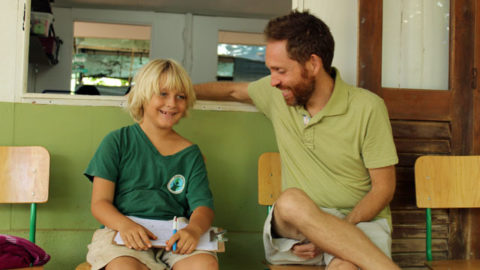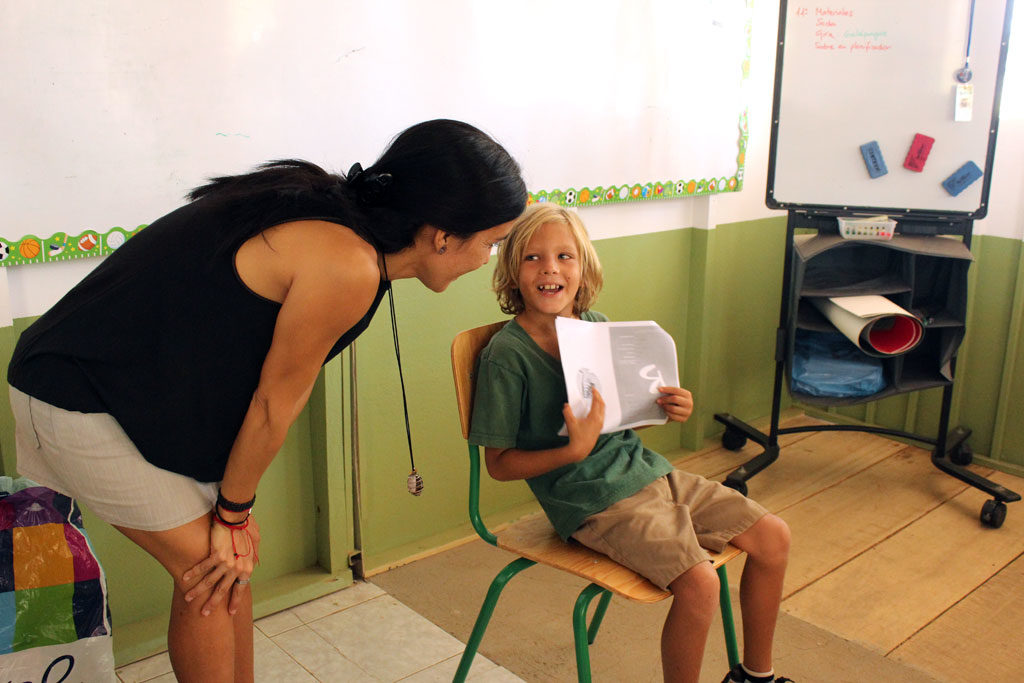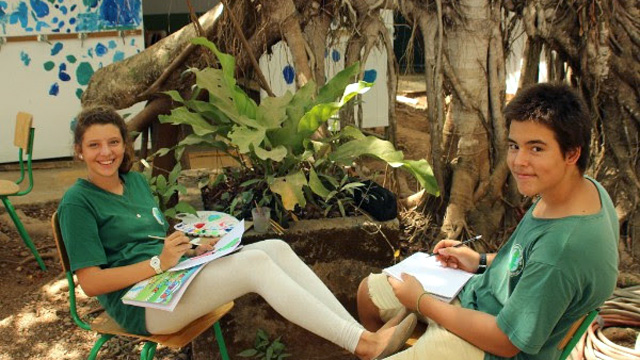
by Stuart Millar, IB coordinator | May 18, 2016

In preparation for submitting our request for authorization to the IB in October we are well underway with teacher professional development. A high class program with successful students comes from having well prepared teachers. Over the next few months teachers will be attending IB workshops in their specific subject areas. In addition, in-school professional development will focus on preparing teachers for these workshops as well as preparing them to write their proposed IB course outlines. Other exciting activities include a visit by our teachers to La Paz Community School in Guanacaste, a bilingual IB school.

by Stuart Millar, IB coordinator | Apr 1, 2016

Futuro Verde es una escuela candidata para el programa de diploma de Bachillerato Internacional *. En los próximos meses estaremos delineando los diferentes elementos del programa de diploma IB, y veremos cómo concretarlos en el día a día de Futuro Verde.
La intención del IB, y la de Futuro Verde, es utilizar un enfoque holístico, en la educación y desarrollo integral del estudiante. En el programa de diploma esto se logra no sólo ofreciendo amplitud y profundidad en las materias académicas tradicionales en el aula, sino también mediante la exposición de los estudiantes a diferentes experiencias que les proporcionan una multitud de oportunidades para el aprendizaje y el crecimiento personal. Al igual que en Futuro Verde, los estudiantes son vistos como el centro de su propio viaje educativo de toda la vida. Para recibir el Diploma IB, los estudiantes deben cumplir los requisitos de tres materias centrales, así como la de seis materias grupales. Todos tienen la misma importancia. Las materias centrales son: creatividad, actividad y servicio (CAS); Teoría del Conocimiento (TdC); y la Monografía. Las seis materias grupales son: lengua y la literatura; adquisición de lenguaje; los individuos y las sociedades; ciencias; matemáticas; las artes.
Ya que 10° grado se embarca en sus proyectos comunitarios es un buen momento para entender lo que creatividad, actividad y servicio (CAS) podría implicar.
-
Creatividad: artes visuales y escénicas, diseño digital, la escritura, el cine, la artesanía y las artes culinarias. Culminando con un producto o rendimiento original.
-
Actividad: deportes individuales o de equipo, de baile o actividades al aire libre que contribuyen a un estilo de vida saludable.
-
Servicio: los estudiantes identifican y hacen frente a un problema global en su comunidad local.
Esta materia fundamental es supervisado por el coordinador de CAS del colegio durante un período de 18 meses. Destinado a ser divertido y desafiante personalmente, CAS implica una mezcla de experiencias individuales y un proyecto de grupo. Los estudiantes estarán obligados a: seleccionar sus propias experiencias y proyectos; establecer metas y objetivos; llevar un portafolio que contenga ambas piezas de reflexión personal y demuestre con evidencias logros de lo aprendido.
Asegúrese de seguir a los estudiantes de 10º grado a través de los boletines informativos y medios sociales de comunicación a medida que completan sus proyectos comunitarios.
* Centro Educativo Futuro Verde es una escuela candidata para el Programa del Diploma. Esta escuela está llevando a cabo la autorización como un Colegio del Mundo del IB. Estas son escuelas que comparten una filosofía común -un compromiso de educación de alta calidad, desafiante e internacional que el Centro Educativo Futuro Verde cree que es importante para nuestros estudiantes.
Sólo los colegios autorizados por la Organización del IB pueden ofrecer cualquiera de sus cuatro programas académicos: el Programa de la Escuela Primaria (PEP), el Programa de los Años Intermedios (PAI), el Programa del Diploma o con orientación profesional del Programa (CP). estatus de candidato no asegura que se concederá la autorización.
Para más información sobre el IB y sus programas, visite http://www.ibo.org

by Stuart Millar, IB coordinator | Apr 1, 2016

Futuro Verde is a candidate school for the International Baccalaureate diploma program*. Over the next few months we will be outlining the different elements of the IB diploma program, and considering how these might come to life at Futuro Verde.
IB’s intention, as it is at Futuro Verde, is to utilize a holistic approach, educating and developing the whole student. In the diploma program this is accomplished not only by offering breadth and depth in traditional academic subjects inside the classroom, but also by exposing students to different experiences that provide them with a multitude of opportunities for personal learning and growth. Just as at Futuro Verde, students are seen as being at the center of their own lifelong educational journey. To receive the IB diploma, students must satisfy the requirements of three core subjects as well as those of the six group subjects. All are seen as having equal importance. The core subjects are: creativity, activity, service (CAS); theory of knowledge (TOK); and the extended essay. The six subject groups are: language and literature; language acquisition; individuals and societies; sciences; mathematics; the arts.
As 10th grade embarks on their community projects it’s a good time to try and understand what creativity, activity, service (CAS) might involve.
-
Creativity – visual and performing arts, digital design, writing, film, crafts and culinary arts. Culminating with an original product or performance.
-
Activity – individual or team sports, dance or outdoor pursuits to contribute to a healthy lifestyle.
-
Service – students identify and tackle a global issue in their local community.
This core subject is supervised by the school’s CAS coordinator over a period of 18 months. Intended to be both fun and personally challenging, CAS involves a blend of individual experiences and a group project. Students will be required to: select their own experiences and project; set goals and objectives; and keep a portfolio containing both pieces of personal reflection and to demonstrate evidence of achieving learning outcomes.
Be sure to follow this year’s 10th grade students through the newsletter and social media as they complete their community projects.
*Centro Educativo Futuro Verde is a candidate school for the Diploma Programme. This school is pursuing authorization as an IB World School. These are schools that share a common philosophy- a commitment to high quality, challenging, international education that Centro Educativo Futuro Verde believes is important for our students.
Only schools authorized by the IB Organization can offer any of its four academic programmes: the Primary Years Programme (PYP), the Middle Years Programme (MYP), the Diploma Programme or the Career-related Programme (CP). Candidate status gives no guarantee that authorization will be granted.
For further information about the IB and its programmes, visit http://www.ibo.org

by Stuart Millar, IB coordinator | Apr 1, 2016

Informados e instruidos
Exploramos conceptos, ideas y cuestiones de importancia local y global. De este modo, se adquiere un conocimiento profundo y comprensión de una amplia y equilibrada gama de disciplinas.
Pensadores
Llevamos a cabo la iniciativa en la aplicación de las habilidades intelectuales de manera crítica y creativa para reconocer y abordar problemas complejos y tomar decisiones razonadas y éticas.
La nueva información nos llega a un ritmo incesante. La BBC informó que el habitante promedio de una ciudad occidental está expuesto a la misma cantidad de datos en un solo día como una persona en el siglo 15 estaba en su vida *. El reto para nuestros hijos es cómo procesar, clasificar y elegir para asimilar (o no) estos nuevos conocimientos.
Los maestros de Futuro Verde ayudan a los estudiantes a cuestionar lo que ya saben, decidir lo que les gustaría saber, y los apoyan en la integración de la nueva información. Las habilidades de pensamiento crítico son de vital importancia ya que los estudiantes comparan y contrastan las diferentes informaciones que encuentran, las evalúan y en última instancia deciden, consciente o inconscientemente, si este nuevo conocimiento será retenido o no.
Lural Ramírez, Directora, asistió recientemente a un taller del IB de Teoría del Conocimiento (TdC). A medida que ella comparte sus experiencias en este entrenamiento, se anima a todo el personal y los estudiantes a reflexionar sobre cómo sabemos lo que pretendemos conocer. Esto viene a través de análisis: la distinción entre el conocimiento compartido y el conocimiento personal; nuestra manera de saber (la emoción, la razón, la imaginación, la fe, la intuición, la memoria, el lenguaje y la percepción sensorial); y nuestras áreas de conocimiento (matemáticas, ciencias naturales, ciencias humanas, las artes, la historia, la ética, los sistemas de conocimientos religiosos, y los sistemas de conocimientos indígenas).
Para apoyar a sus estudiantes, padres y tutores también pueden tener la oportunidad de reflexionar cuando afirman con convicción lo que creen que saben. Ejemplifique y comparta con sus hijos cómo usted cree que llegó a saber algo, sea abierto y honesto acerca de cómo su memoria, las emociones, la fe, etc. podría haber influido en ese proceso.
*Vince, Gaia. “Cities: How Crowded Life Is Changing Us.” BBC. BBC, 17 May 2013. Web. 24 Mar. 2016. http://www.bbc.com/future/story/20130516-how-city-life-is-changing-us.
Dunn, Michael. “Critical thinking and the IB Diploma.” 14th October 2014. Last accessed: 24th March 2016. http://www.theoryofknowledge.net/about/the-tok-course/critical-thinking-ib-diploma

by Stuart Millar, IB coordinator | Apr 1, 2016

Knowledgeable
We explore concepts, ideas and issues that have local and global significance. In so doing, we acquire in-depth knowledge and develop understanding across a broad and balanced range of disciplines.
Thinkers
We exercise initiative in applying thinking skills critically and creatively to recognize and approach complex problems, and make reasoned, ethical decisions.
New information comes at us at a relentless pace. The BBC reported that the average inhabitant of a Western city is exposed to the same amount of data in one day as a person in the 15th century was in their lifetime*. The challenge for our children is how to process, categorize, and choose to assimilate (or not) this potentially new knowledge.
Teachers at Futuro Verde help students question what they already know, decide what they would like to know, and assist them in integrating that new information. Critical thinking skills are vital as students compare and contrast different information they find, evaluate it for bias and ultimately decide, consciously or subconsciously, whether or not this new knowledge will be retained.
Lural Ramírez, Director, recently attended an IB workshop in Theory of knowledge (TOK). As she starts to share from her experiences at this training, all staff and students are being encouraged to reflect on how we know what we claim to know. This comes through analyzing: the distinction between shared knowledge and personal knowledge; our ways of knowing (emotion, reason, imagination, faith, intuition, memory, language, and sense perception); and our areas of knowledge (mathematics, natural sciences, human sciences, the arts, history, ethics, religious knowledge systems, and indigenous knowledge systems).
To support their students, parents and guardians might also take the opportunity to reflect when stating with conviction what they think they know. Model and share with your children how you believe you came to know something, and be open and honest about how your memory, emotion, faith etc. might have influenced that process.
*Vince, Gaia. “Cities: How Crowded Life Is Changing Us.” BBC. BBC, 17 May 2013. Web. 24 Mar. 2016. <http://www.bbc.com/future/story/20130516-how-city-life-is-changing-us>.
Dunn, Michael. “Critical thinking and the IB Diploma.” 14th October 2014. Last accessed: 24th March 2016. <http://www.theoryofknowledge.net/about/the-tok-course/critical-thinking-ib-diploma/>






